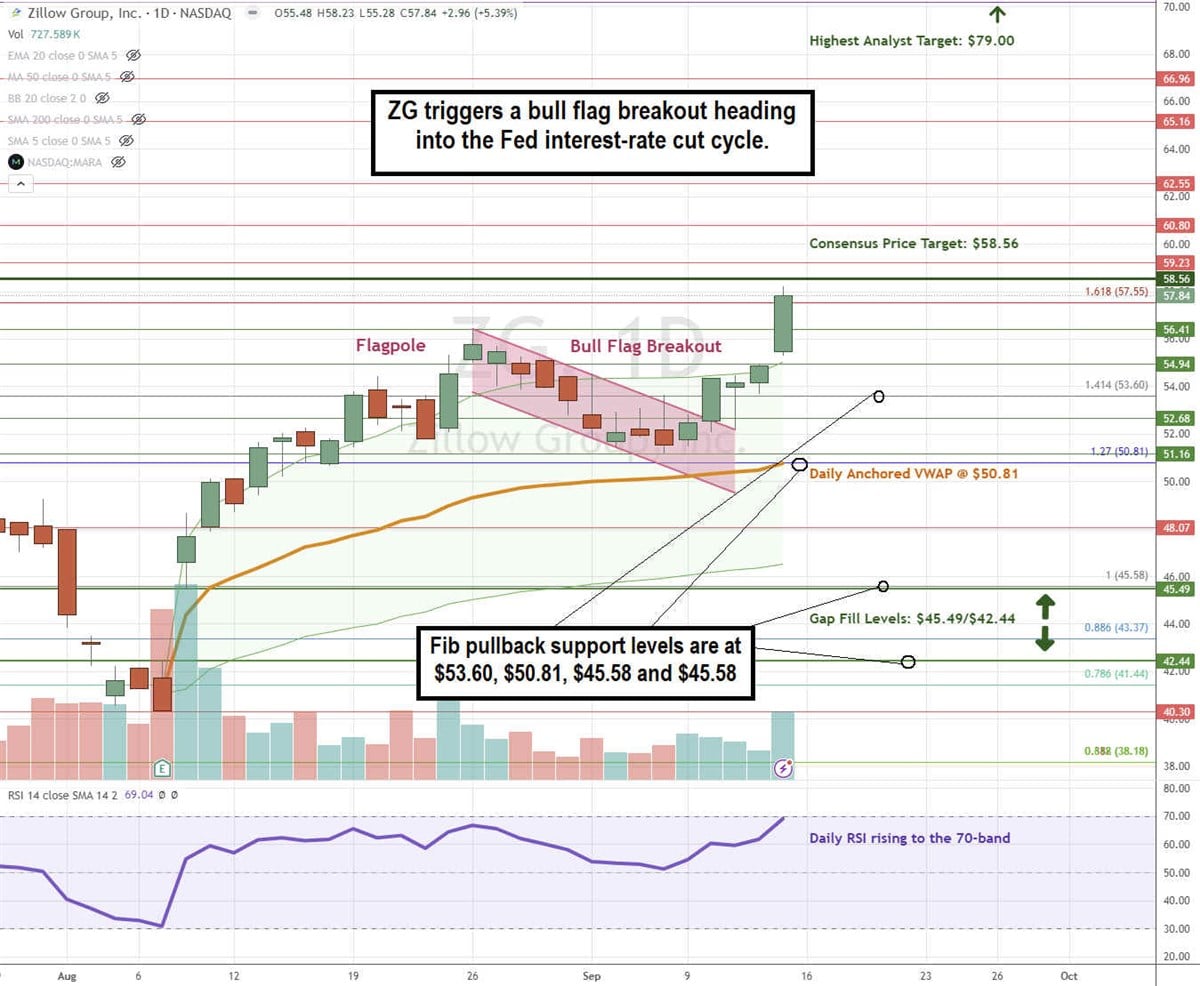
Real estate brokers and online real estate marketplace stocks are surging in anticipation of the Federal Reserve interest rate cut cycle commencing, and investors are paying attention.
Among the stocks seeing an uptick is Zillow Group Inc. (NASDAQ: ZG), which operates many leading online real estate and rental marketplace platforms, enabling consumers and agents to find homes to purchase, sell, rent and finance. While ZG stock has finally gone positive on the year, there may be plenty more upside to go.
Zillow.com: A Residential Real Estate Marketplace Disruptor
Richard Barton and Lloyd Fink, both former executives at Microsoft Co. (NASDAQ: MSFT) executives and founders of Expedia Group Inc. (NASDAQ: EXPE), launched Zillow.com in 2006, and it quickly became a disruptor in the residential real estate marketplace.
The original site offered "Zestimates," which were automated estimates of the value of homes in a neighborhood based on data including bedrooms, square footage, features, and sales comps. This novel idea attracted over a million visits in its first three days, crashing the servers.
Zillow.com still offers its Zestimate home values and extensive details, including photos and videos about the homes, details on open house times, and neighborhood information. It enables users with easy-to-use search and browse capabilities and AI-generated recommendations. Users can opt to buy, rent, or finance a home and provide interactive maps and search filters.
Zillow Group's Ecosystem of Brands and Businesses
While many investors associate Zillow Group with only Zillow.com, the company has now grown its portfolio of brands and businesses to become the largest online real estate company in the United States. Zillow Group's ecosystem covers various aspects of real estate transactions, from searching for properties to managing listings and facilitating sales
Websites include:
- Zillow.com: A leading online marketplace for buying, selling, and renting homes.
- Trulia: Another home search platform with a focus on neighborhood insights.
- StreetEasy: A real estate marketplace primarily serving the New York City area.
- HotPads: A rental-focused platform offering search tools for renters.
Services include:
- Zillow Home Loans: Provides pre-approvals and financing options.
- Zillow Premier Agent: Connects users with Zillow's network of professional realtors.
- Zillow Rentals: Allows landlords to list rentals for free, screen tenants, sign leases, and collect rent, reaching over 30 million monthly visitors.
Software tools include:
- ShowingTime: Automates scheduling and management of property showings for agents and buyers.
- Dotloop: Facilitates collaboration between all parties of the real estate transaction.
- Bridge Interactive: Provides internet data exchange (IDX) websites and marketing tools for agents and brokers.
Zillow Group competes with other online real estate marketplaces in the computer and technology sector like Redfin Co. (NASDAQ: RDFN), Compass Inc. (NYSE: COMP), and RE/MAX Holdings Inc. (NYSE: RMAX).
Flipping Houses Was a Bust
Zillow shuttered Zillow Offers, its automated home buying service, on November 2, 2021, after it lost nearly a billion dollars mispricing its offers and inaccurately predicted a trend of flipping homes. This led to the company laying off 25% of its workforce, or around 2,000 employees. This dark cloud is now in the rearview mirror as the company has been staging a turnaround.
Zillow’s Business Was Already Turning Around Before Rate Cuts
The market is always forward-thinking. Zillow's business already bottomed out and started its turnaround ahead of the expected rate cuts. Zillow Group reported its second-quarter 2024 EPS of 39 cents, beating analyst estimates by 14 cents. Revenues climbed 13% year-over-year (YoY) to $572 million, beating $538.36 million consensus estimates. Adjusted EBITDA of $134 million crushed its previous guidance of $85 million to $100 million.
Residential revenue rose 8% YoY to $409 million. Rentals revenue grew 29% YoY to $117 million. Multifamily revenue rose 44% with 44,000 properties, up from 40,000 in Q1 2024. Despite a challenging mortgage-rate environment, its Mortgages segment revenue rose 42% YoY to $34 million.
Zillow Sets the Bar Low for Third-Quarter 2024 Earnings
Zillow Group issued in-line Q3 2024 revenue guidance of $545 million to $560 million versus $552.82 million consensus estimates. Adjusted EBITDA is expected between $95 million to $110 million. The guidance accommodates a flattish housing market.
At the September 10, 2024, Goldman Sachs Communacopia + Technology Conference, CEO Jeremy Hoffman commented: “So today, we sit in a privileged position where we are anywhere between 65% and 70% of all audience share, and we are 3x the size of anyone else on the app front as well. We have 80% plus organic traffic and direct traffic, so we feel quite good about the quality of the product that we've built and the brand recognition that we have.”
Hoffman added that that ‘Zillow’ is more often Googled than the term ‘real estate.'
ZG Stock Triggers a Bull Flag Breakout
A flag pattern forms after a steep run-up that peaks at a swing high and forms a parallel change pullback comprised of a descending upper trendline resistance and lower descending trendline support. The bull flag is triggered when a stock surges through the descending upper trendline resistance.

ZG formed a bull flag breakout through $52.68 on September 10, 2024, and has climbed toward the consensus price target of $58.56. The daily anchored VWAP support is at $50.81. The daily relative strength index (RSI) is rising to the 70-band. Fibonacci (Fib) pullback support levels are at $53.60, $50.81, $45.58 and $45.58.
Zillow Group’s consensus analyst price target is at $58.56, with its highest analyst price target at $79.00.
Actionable Options Strategies
Bullish investors can consider using cash-secured puts at the Fib pullback support levels to buy the dip. If assigned the shares, then writing covered calls at upside Fib levels executes a wheel strategy for income.
Bullish options investors can limit maximum downside and profit from potential stock price gains with less capital than owning the stock by implementing a bullish call debit spread.